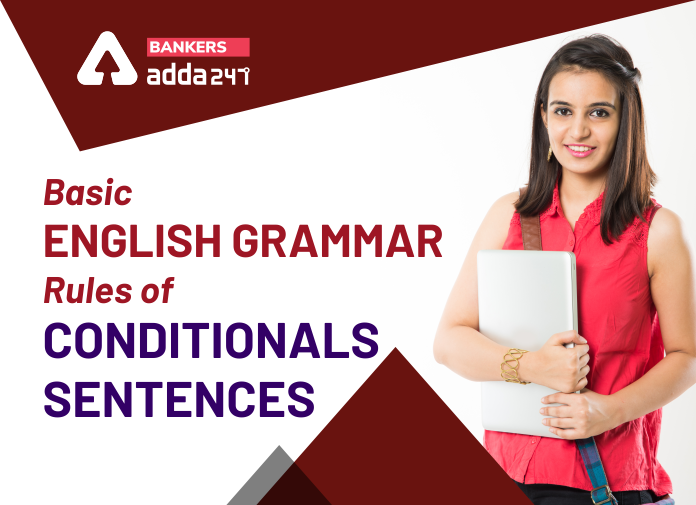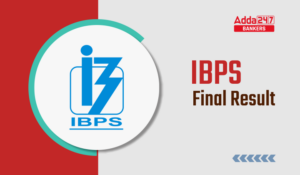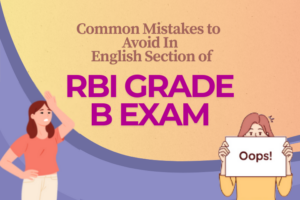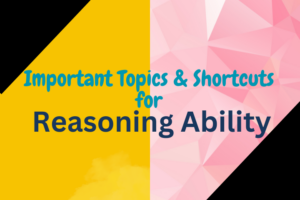Table of Contents
The English Language is one of the most important section in banking exams and Conditionals Sentences is an extremely important topic. Conditional sentences are statements discussing known factors or hypothetical situations and their consequences. You cannot score marks in this section until you are well-versed in grammatical rules. You can never cram the rules, you can only practice them. One of the most important topics from which questions are asked is Conditional sentences,so in this article, we will covering the basic English Grammar rules of conditional sentences so you can be able to solve the questions related to conditional sentences.
Also read,
What Is Conditional Sentences?
Conditional sentences are also known as conditional clauses or “If clauses”. They are used to denote that ‘the action in the main clause (without if) can only take place if a certain condition (in the clause with if) is fulfilled.
Ex- You will succeed provided you work hard
Also Read,
| How to Master Reading Comprehension to Score Maximum Marks? | Importance of Spoken English and How to Improve it? | SBI PO Prelims Study Plan 2020 |
The Following Words Are used to introduce the condition of a sentence:
- If
- Provided
- As soon as
- No sooner than
- Unless
- Until
- When
Conditional sentences have two parts:
- If clause
- Main Clause
Example- If i have enough money, i will go to japan.
Here from “If” to “Money” is If clause while “I” to “Japan” is main clause.
Also read,
- How to Increase Calculation Speed to Crack Bank Exams?
- English Grammar Rules that Can Get You Confused
Conditional sentences is of three types:
- When “If clause” is in present tense
- When “If clause” is in Past Tense
- When “If clause” is in Past Perfect Tense
Rules related to When “If clause” is in present tense
General Formula: If+ Simple present, Simple Future
Rule 1– In such sentence, ” If Clause” is in simple present tense and the mains clause is in simple future tense.
Example– If i will find address, i will send her an invitation.
Rule 2- If two action take place one after other in future, and if the second action depends on the first action, the first action is in simple present tense and the second action is in simple future tense.
Example– If will help him provided he will mends his ways ( Incorrect))
I will help provided he mends his ways ( Correct)
Rule 3- In the above sentence, ” Will, shall, Would” will not come with the part that consist If, as soon as, provided, before, after, Until, Unless, In case, When and Lest.
” Not is not used with untill/unless”
In conditional sentences, Will/Shall not be used with when.
Example- There will be rush at the platform when the train will arrive ( Incorrect)
There will rush at the platform when the train arrives ( Correct)
If ‘ If clause’ is in past tense:
General Formula: IF+ Simple Past, Subject+ Would + Verb (1)
Example– If I had money, would lend it you
3. If ‘ If clause’ is in Past Perfect Tense
General Formula: IF+Past Perfect Tense, Subject+ Would + Have+ Verb (3)
Example- If I had seen you, I could have stopped my car
In such sentences, We can also replace If with had this will not change the meaning of the sentence.
Also Read,
| Upcoming Bank Exams 2020 | Government Jobs for Graduates 2020 | Consumer Price Index: Definition, Types, Measurement |
Three Important Formula:
- If+ Present Indefinite, Simple Future
- If+ S+ V (2), S+ Would + V(1)
- If+ S+ Had+V (3), S+ Would +Have +V (3)
Click Here to Register for Bank Exams 2020 Preparation Material
Visit Achieversadda.com and participate in discussions with other aspirants and achievers. Get answers to your queries and connect with others on Achieversadda.com
| SBI PO 2020 | IBPS PO 2020 | SBI Clerk 2020 | IBPS Clerk 2020 |
| RBI Grade B 2020 | RBI Assistant 2020 | LIC AAO & AE | SEBI Grade A 2020 |




 IBPS Final Result 2025 Coming Out Tomorr...
IBPS Final Result 2025 Coming Out Tomorr...
 Simple Tips to Avoid Common Mistakes In ...
Simple Tips to Avoid Common Mistakes In ...
 Important Topics & Shortcuts for IDB...
Important Topics & Shortcuts for IDB...


